 Petzlover
Petzlover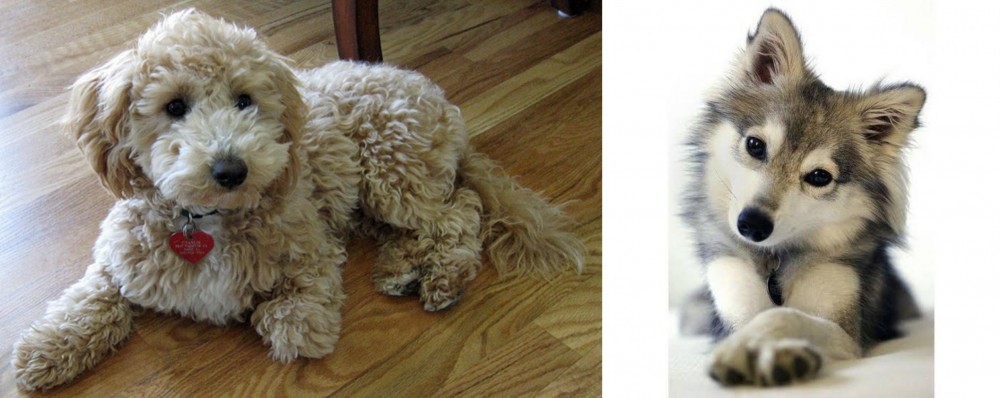 Bichonpoo is originated from Australia but Miniature Siberian Husky is originated from United States. Both Bichonpoo and Miniature Siberian Husky are having almost same height. Both Bichonpoo and Miniature Siberian Husky are having almost same weight. Both Bichonpoo and Miniature Siberian Husky has almost same life span. Bichonpoo may have less litter size than Miniature Siberian Husky. Bichonpoo requires High Maintenance. But Miniature Siberian Husky requires Moderate Maintenance
Bichonpoo is originated from Australia but Miniature Siberian Husky is originated from United States. Both Bichonpoo and Miniature Siberian Husky are having almost same height. Both Bichonpoo and Miniature Siberian Husky are having almost same weight. Both Bichonpoo and Miniature Siberian Husky has almost same life span. Bichonpoo may have less litter size than Miniature Siberian Husky. Bichonpoo requires High Maintenance. But Miniature Siberian Husky requires Moderate Maintenance
 This popular little dog was developed by crossing the Poodle with the Bichon Frise to create the Bichonpoo. They are also called the Poochon and sometimes called the Birchpoo. They are a soft, curly breed and they are extremely cute – a very cuddly breed. They are not recognized by the AKC, CKC or the UKC. Some other kennel clubs do accept them and welcome them into obedience and agility trials. The breed was originally developed in Australia as a household pet for those who want a “curly lap dog” that was hypoallergenic, did not shed and had a great temperament for life in families with children. They were first developed in the latter part of the 20th century.
This popular little dog was developed by crossing the Poodle with the Bichon Frise to create the Bichonpoo. They are also called the Poochon and sometimes called the Birchpoo. They are a soft, curly breed and they are extremely cute – a very cuddly breed. They are not recognized by the AKC, CKC or the UKC. Some other kennel clubs do accept them and welcome them into obedience and agility trials. The breed was originally developed in Australia as a household pet for those who want a “curly lap dog” that was hypoallergenic, did not shed and had a great temperament for life in families with children. They were first developed in the latter part of the 20th century.
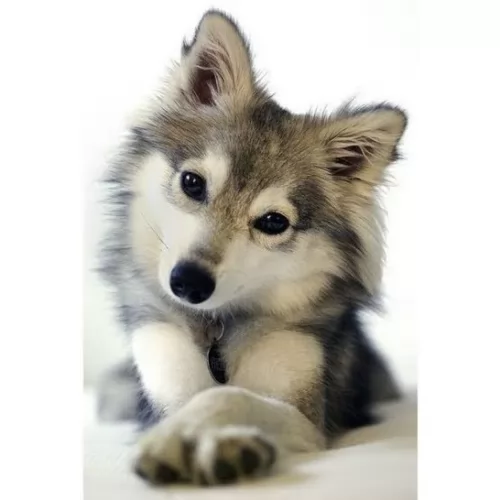 Miniature Siberian Huskies – also known as mini huskies – are your regular Siberian husky bred to be that much smaller than what the breed standard dictates.
Miniature Siberian Huskies – also known as mini huskies – are your regular Siberian husky bred to be that much smaller than what the breed standard dictates.
They’re sought after by those who love the regular sized Siberian Husky but who find the larger dog too large and boisterous. They come complete with the looks and the temperament of the Siberian Husky but they are smaller.
The origins of these gorgeous Mini huskies is conflicting though as some believe they originated in the USA. The name of Bree Normandin is bandied about when talking of the breed’s origin while other refer to Linda S. Spurlin from Alaska. She became interested in them when her full-sized husky became pregnant by a small dog.
Spurlin used Siberian and Alaskan Huskies as well as small Schipperkes and American Eskimo Dogs to bring about the mini version. They’ve got the same pedigree as the Siberian Husky, but it has been selectively bred for its smaller size, also coming from the Spitz family of dogs.
The Miniature Husky is genetically the same as the larger Siberian Husky and the AKC doesn’t recognize it as a separate breed, but sees it as a different size variation of the working-group Siberian Husky.
 This Bichon Frise-Poodle cross is a small dog with big personality. The original hybrid is 50% Poodle and 50% Bichon Frise. This is considered a first-generation hybrid. The second-generation hybrid is 50% Bichonpoo and 50% purebred Bichon Frise or Poodle. Then third generation hybrids are a cross between two second generation dogs. There is no fourth generation and most breeders do not offer even a third generation. The original hybrid can be healthier than the parents, but any flaws tend to show up in 2nd generation hybrids and it gets worse with third generation. This dog should be hardy, well-proportioned and robust. They are small, sweet and sturdy. Because there are three different sizes of Poodles, there can be three different sizes of the Bichon Poo – Standard, Mini and Toy.
This Bichon Frise-Poodle cross is a small dog with big personality. The original hybrid is 50% Poodle and 50% Bichon Frise. This is considered a first-generation hybrid. The second-generation hybrid is 50% Bichonpoo and 50% purebred Bichon Frise or Poodle. Then third generation hybrids are a cross between two second generation dogs. There is no fourth generation and most breeders do not offer even a third generation. The original hybrid can be healthier than the parents, but any flaws tend to show up in 2nd generation hybrids and it gets worse with third generation. This dog should be hardy, well-proportioned and robust. They are small, sweet and sturdy. Because there are three different sizes of Poodles, there can be three different sizes of the Bichon Poo – Standard, Mini and Toy.
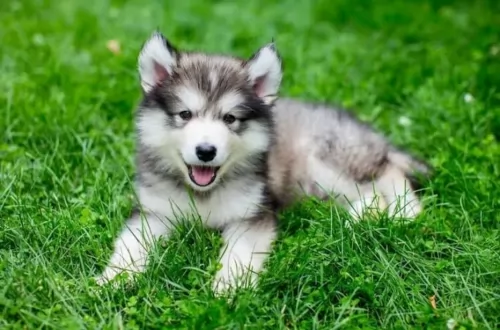 Known also as the Alaskan Klee Klai,the Miniature Siberian Husky stands at 33-39cm in height and weighs between 8 - 11kg.
Known also as the Alaskan Klee Klai,the Miniature Siberian Husky stands at 33-39cm in height and weighs between 8 - 11kg.
These mini huskies are like the larger huskies and can also come in a range of color variations such as grey and white, black and white or red and white for instance. In typical Spitz dog fashion they have the erect ears and long bushy tail. A striking feature of these dogs is the beautiful eyes – they can be brown but also a mesmerising blue.
This Miniature Siberian Husky is an intelligent dog and you’re not going to have any trouble with him teaching him some basic commands such as sit, lie-down and stay.
You need to know that these dogs aren’t going to be content lying around all day and that they want to be kept busy almost around the clock. They have always been working dogs so he will need plenty of mental – and physical exercise to keep him content. A bored, frustrated Mini Husky will just develop problem behavior through no fault of his own. People who buy high energy dogs have a responsibility towards them to keep them busy and well exercised.
These dogs are similar to their genetic ancestor, the wolf, and instead of barking, you may find him trying to communicate with a howl. One thing is sure, they make great family pets, and their gentle nature allows them to get on well with children and also not to show aggression with other dogs. They’re loyal, outgoing and charming.
 The Bichonpoo is affectionate, intelligent and active just as you might expect from a Poodle/Bichon Frise cross. He loves people and lives well with other animals. He is particularly fond of children and loves to play with gentle older children. However, the temperament and characteristics of the hybrid are not as predictable as their parents. The characteristics of the Bichonpoo depends upon its lineage – if it is first generation, second generation or third generation. With each successive generation there is less predictability in the characteristics of the individual dog. Regardless of generation, the Bichonpoo will need exercise and mental stimulation. They are loving, good-natured and accommodating to their environment. They want to be with their owner and can get very attached.
The Bichonpoo is affectionate, intelligent and active just as you might expect from a Poodle/Bichon Frise cross. He loves people and lives well with other animals. He is particularly fond of children and loves to play with gentle older children. However, the temperament and characteristics of the hybrid are not as predictable as their parents. The characteristics of the Bichonpoo depends upon its lineage – if it is first generation, second generation or third generation. With each successive generation there is less predictability in the characteristics of the individual dog. Regardless of generation, the Bichonpoo will need exercise and mental stimulation. They are loving, good-natured and accommodating to their environment. They want to be with their owner and can get very attached.
Depending on their parents they can be anxious and high strung like the Poodle or nippiness and ‘small dog syndrome’ of the Bichon Frise. Separation anxiety can be a major issue with this breed. Do not let your Bichonpoo become dominate in your home or they will assume the alpha position and become very bossy, especially with children. He is easy to train and a good watchdog as well.
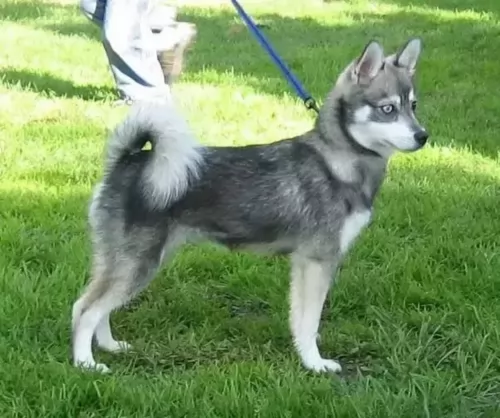 Your cuddly Mini Siberian Husky is such an intelligent dog, active and social and guaranteed to make you a splendid pet.
Your cuddly Mini Siberian Husky is such an intelligent dog, active and social and guaranteed to make you a splendid pet.
Being somewhat wary and aloof with strangers, they also make good watchdogs. They do well with children who have been taught to be kind and gentle with animals.
With good care your dog can reach up to 15 years of age, providing you with many years of superb friendship.
 The Bichonpoo is usually healthier than either the Poodle or the Bichon Frise. At the same time, they could inherit any of health concerns of either of their parents in the first generation Bichonpoo. They are however likely to develop ear infections and skin allergies. Cleaning and grooming is essential, especially the ears, but also to prevent matting which could lead to skin infections.
The Bichonpoo is usually healthier than either the Poodle or the Bichon Frise. At the same time, they could inherit any of health concerns of either of their parents in the first generation Bichonpoo. They are however likely to develop ear infections and skin allergies. Cleaning and grooming is essential, especially the ears, but also to prevent matting which could lead to skin infections.
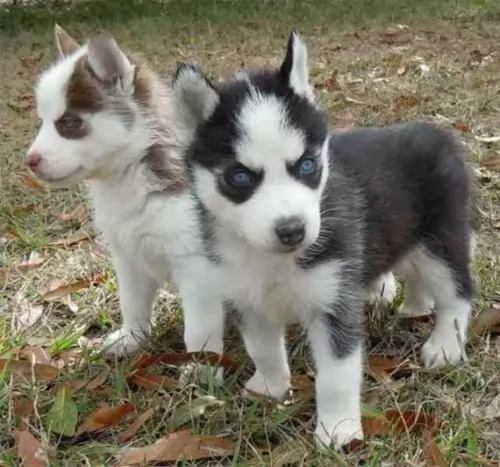 Your Miniature Siberian Husky is a healthy dog and you won’t have to spend too much money on him at the vet. However, just like with any other dog, he can battle with some of the common dog diseases -
Your Miniature Siberian Husky is a healthy dog and you won’t have to spend too much money on him at the vet. However, just like with any other dog, he can battle with some of the common dog diseases -
This eye problem affects about 10% of all Siberian Huskies and its not limited to old dogs. Juvenile cataracts can affect young dogs too. Luckily the problem isn’t painful for the dog.
Skin problems can be a concern for the Mini Siberian Husky, especially as one is used to seeing these dogs with thick coats. Follicular dysplasia is a genetic condition that causes patchy hair loss as well as a scaly, infected skin.
Check out that your dog is receiving nutritious food with vitamins and minerals as a zinc deficiency for instance can cause hair loss as well as skin problems.
 The Bichonpoo is an energetic little dog and needs enough nutrition to keep up with his needs. Feed a Bichonpoo at least twice a day – small meals- and dry food because of dental issues. A high-quality food will help to prevent allegories.
The Bichonpoo is an energetic little dog and needs enough nutrition to keep up with his needs. Feed a Bichonpoo at least twice a day – small meals- and dry food because of dental issues. A high-quality food will help to prevent allegories.
The Bichonpoo is the product of the poodle who is prone to bloat and Addison’s Disease and the Bichon Frise who is susceptible to Patella luxation, progressive retinal atrophy and liver shunts. The first generation Bichonpoo should be free of these health concerns. You should be aware that there is a possibility that the first-generation hybrid could contract any of its parents’ illnesses or deficiencies.
This hybrid is a high energy dog and needs daily exercise in the form of walks and play. They have the intelligence and skill of the Poodle with the energetic desire to play of the Bichon Frise. They need toys and a person to play with. She will need to be both mentally and physically stimulated. If she gets bored she will become destructive and noisy with barks and whines.
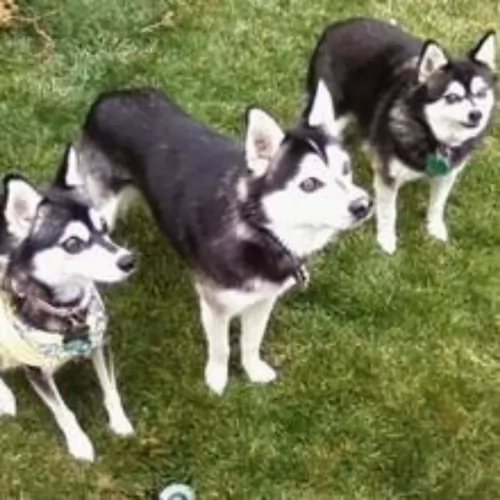 The Miniature Husky is an active and energetic breed that is going to require a lot of exercise. He is able to adapt to life in the city or the countryside but wherever you keep him as a pet, he will require regular daily exercise.
The Miniature Husky is an active and energetic breed that is going to require a lot of exercise. He is able to adapt to life in the city or the countryside but wherever you keep him as a pet, he will require regular daily exercise.
These dogs are used to cold climates so make sure your Mini Siberian Husky doesn’t overheat. Make sure that when he’s outdoors, there is shade for him and a water bowl. You’ll be doing him a real favor if you provide him with a small paddling pool to dip into on a hot day.
These are clean, odorless dogs that actually require little human help to be groomed. You can give your dog a good brush twice a week.
Mini Siberian Huskies, like the larger breed, have a high metabolism, so small amounts of highly nutritious food will do well with them. If you intend feeding your one commercially manufactured food, make sure its the high quality food that comes with plenty of minerals and vitamins. Try and avoid the low quality brands that come packed with unhealthy preservatives and colorants.
Dogs do well on simple, nutritious diets, so some boiled chicken, brown rice and raw and cooked vegetables such as carrots, potatoes and spinach added into the dry kibble from time to time will do him wonders.
Also try and include some raw meat into the kibble from time to time. That's it, as simple as that- no exotic, spicy foods and foods which we humans eat such as nuts, chips and chocolate – all can be toxic for your pet and just give him an upset stomach.
Make sure fresh, cool water is constantly available.